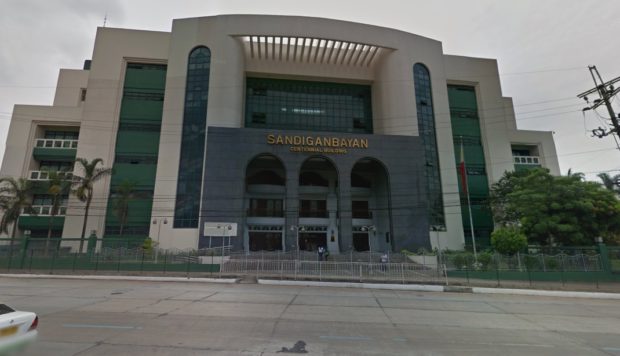Graft court clears former Malabon-Navotas lawmaker, 10 others

The Sandiganbayan Centennial Building in Quezon City. (INQUIRER.net file photo)
MANILA, Philippines — Former Malabon-Navotas Rep. Federico Sandoval II has been cleared of graft and technical malversation by the Sandiganbayan over the allegedly anomalous purchase of a shredder worth P3 million under the Arroyo administration’s banner program for agriculture.
In a decision dated Oct. 25, the Sandiganbayan’s Second Division said the prosecution failed to establish the guilt of Sandoval and his 10 co-accused, most of whom were former officials of the Department of Agriculture’s (DA) Regional Field Unit (RFU) IV.
Also acquitted were former DA-RFU IV officials Dennis Araullo, Juvylee Obice, Raymundo Braganza, Lourdes Imperial, Abelardo Bragas, Felix Ramos, Ofelia Montilla, Gregorio Sangalang, and Balagtas Torres.
A private respondent, Remus Villanueva, president of shredder supplier LCV Design and Fabrication Corp., was also cleared of the charges.
The case filed by the Office of the Ombudsman stemmed from an investigation by the Commission on Audit (COA) on the alleged misuse of P728 million in funds under the Ginintuang Masaganang Ani (GMA), a DA-led program to modernize agriculture and fisheries in selected areas nationwide.
Article continues after this advertisementNo public bidding
In March 2004, the DA’s central office issued a memorandum requesting a sub-allotment of funds, which was coursed through a unit then headed by Araullo.
Article continues after this advertisementThrough the memo, P3 million was allocated for the then-lone district of Malabon-Navotas represented by Sandoval. (It was split into two congressional districts in 2010.)
Sandoval sent a purchase letter to Araullo requesting the procurement of one unit of Tornado Brush chipper/shredder, which the DA officer approved.
Citing the COA findings, the Ombudsman said Sandoval and the other accused made the equipment purchase from LCV Design and sourced the funds from GMA without public bidding.
The COA report called the direct contracting “unlawful” since LCV Design’s patent application for the Tornado chipper was not yet approved by the Intellectual Property Office. It also cited “overpricing” in the purchase, aside from the machine being “not operational.”
This led to the Ombudsman’s indictment of Sandoval and others for graft and technical malversation.
Justified purchase
The Sandiganbayan, however, was not satisfied with the evidence presented by state prosecutors.
According to the court, the method of direct contracting was justified since the purchase involved goods of proprietary nature, or covered by patents or copyrights, and that the prosecution did not present any documents proving the funds came from the 2003 national budget.
Villanueva, as president of LCV, countered that his company’s patent application was converted into a utility model application, granting him the same rights as a patent holder.
“Villanueva’s copyrights over the Tornado shredder/chipper and its blade mechanism make him the proprietary source of the machine before and during the time of procurement because the machine was created in the year 2001,” read the decision penned by Associate Justice Arthur Malabaguio, and concurred in by Associate Justices Oscar Herrera Jr. (the division chair) and Michael Frederick Musngi.
The court said there was no unwarranted benefit or preference given to LCV since the prosecution failed to show there were other chippers in the market with the same specifications as that of the Tornado unit.
As to the alleged malversation, the Sandiganbayan said the prosecution had the burden of showing that the General Appropriations Act of 2003 was the source of the P3-million funds for the machine’s purchase.
State prosecutors, however, only showed the special allotment release order, which the Sandiganbayan said was not the equivalent of a law or ordinance that appropriates public funds.
It explained that the third element of technical malversation “specifically requires that the public funds applied for a different purpose must have been appropriated by law or ordinance.”
“In both cases, the evidence presented by the prosecution failed to establish the guilt of any of the accused beyond reasonable doubt,” the court said.